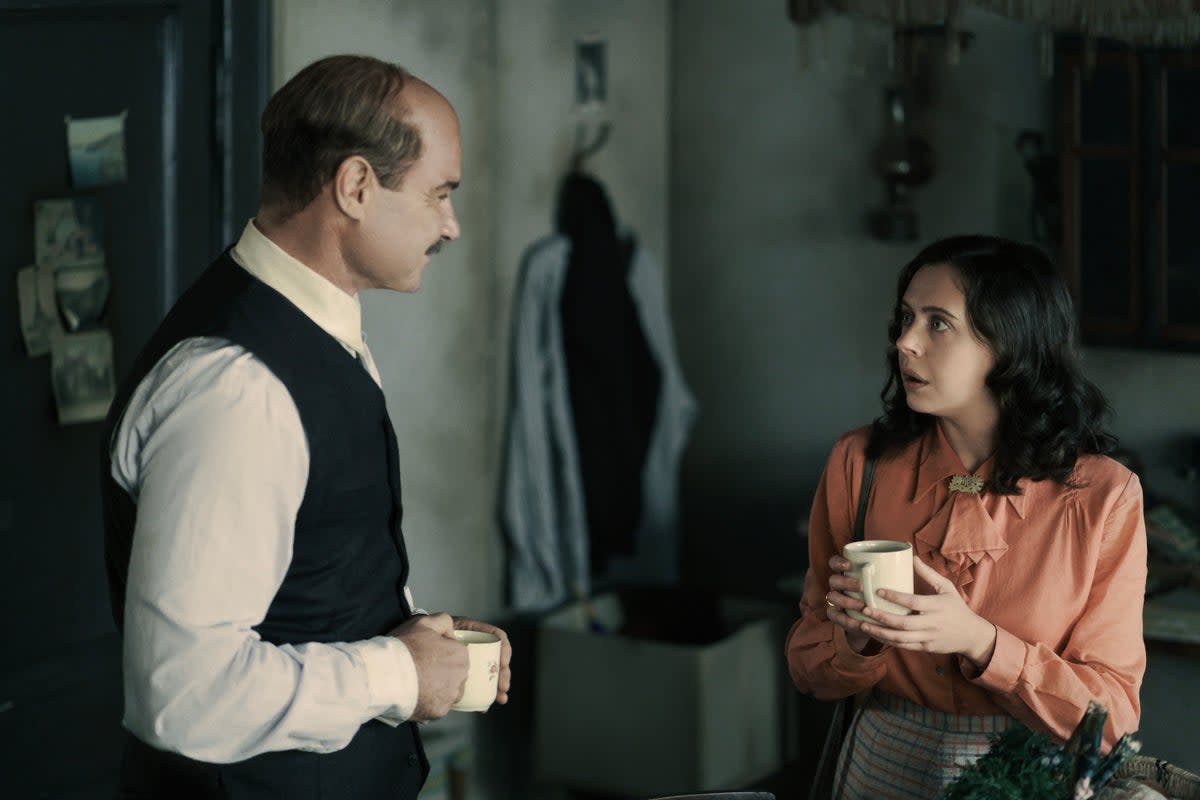New series about the Anne Frank story is under attack by antisemitic trolls, creators say

- Oops!Something went wrong.Please try again later.
- Oops!Something went wrong.Please try again later.
- Oops!Something went wrong.Please try again later.
- Oops!Something went wrong.Please try again later.
- Oops!Something went wrong.Please try again later.
Antisemitic trolls almost immediately began attacking a new Disney+ show about Miep Gies, who helped hide Anne Frank and her family from the Nazis, when its creators posted a teaser trailer online earlier this month, they told The Independent.
A Small Light, starring Liev Schreiber and Bel Powley, is a National Geographic production that debuts 2 May on Disney+. Husband-and-wife team Joan Rater and Tony Phelan, famed as Grey’s Anatomy showrunners, are credited as writers and producers on the show, along with producer/director Susanna Fogel.
“Joan and I posted the trailer on our Facebook pages, and immediately some trolling, antisemitic memes, were popping up -- and people were posting on the sites that were posting the trailers to promote the show,” Ms Fogel told The Independent in the run-up to the show’s debut.
The plot focuses on Miep Gies, a spirited young newlywed employee of Otto Frank, and her husband, Jan, a social worker, who worked bravely to ferry food, provisions and news of the outside world to the Franks and four other Jews hidden in secret rooms within the building that housed Mr Frank’s business. Miep, Jan and others in Nazi-occupied Amsterdam risked their own safety every day to help their friends, who were tragically discovered in August 1944.
Mr Frank was the sole survivor of his immediate family, and it was Miep who preserved and handed over Anne Frank’s diary to the grieving father with the words: “This is the legacy of your daughter.”
The show’s creators said they felt “huge responsibility” bringing the stories of quiet heroism to the screen -- and the backlash proves just how important such tales remain in the present day.
“It’s a bit of a chicken and egg thing with social media being a place where people can traffic in their racist ideas and all sorts of problematic and toxic behavior; it gives a platform and community to people to just sort of metastasize that negativity,” Ms Fogel told The Independent, adding: “Historians can analyse, was this always a bubbling undercurrent, or is it now, things are scary?
“In this moment of fear, people are trying to sort of close ranks and push other people away, which then leads to xenophobia and immigration policies being what they are and whatever ... it feels like this is relevant now more than ever, but maybe it never became irrelevant.”
Regarding the antisemitic backlash, she said: “Look no further than that to see what’s relevant, and not just antisemitism, but all sorts of discrimination of all kinds.”
She said the negative reaction to such an inspirational true story left her feeling “shocked -- but just more committed to ... promoting the hell out of the show, basically, because I’m like, ‘Okay, oh -- this is still a thing. Okay. Well, I guess now we really need people to see that.”
Ms Rater added: “Tony and I went to dinner in Los Angeles and came out, and in the parking lot ... all the cars had a leaflet, crazy antisemitic leaflet, last year.”
Their hope for the show is that it promotes, instead, tolerance and altruism, helping future generations to avoid the pitfalls of hatred and violence.
“We want people to engage in the world around them more than maybe they need to, just because we all have the option; I mean, some of us more than others have the privilege of living in places where we don’t have war right outside our door,” Ms Fogel said. “So we can kind of just scroll to the next thing online if we don’t feel like thinking about it.
“But whatever the injustices are in our different worlds, there’s some way that we can think about it, help in a small way, a little bit more, no matter how old we are or where we live,” she said, adding that the creators “wanted to make this part of history relevant to people who can then see the echoes in what’s going on now in the world and make sure that that history is not forgotten -- but also that there are parallels now, even just in terms of the humanism of the story, not even just the greater political context of it, but Miep did something to help somebody else that she didn’t have to do. That’s what the story’s about.”

